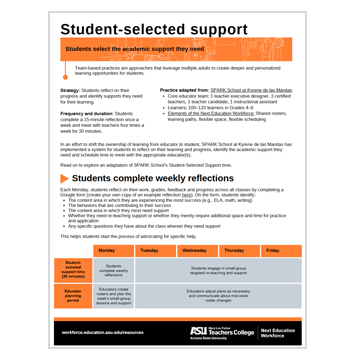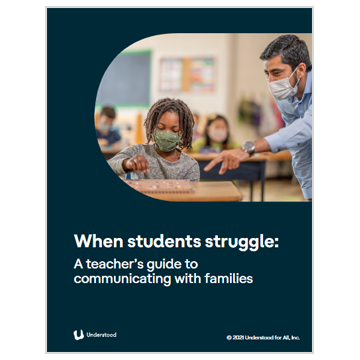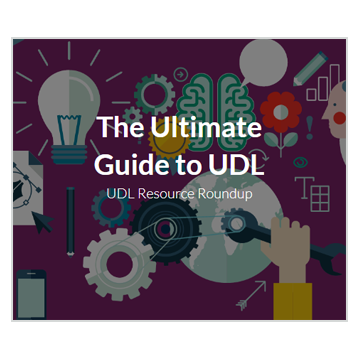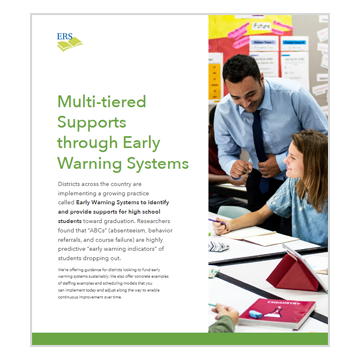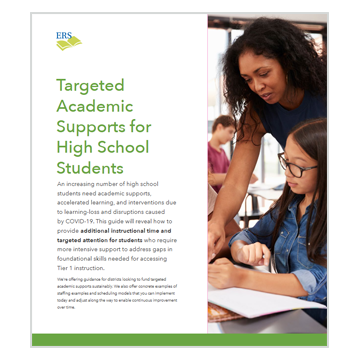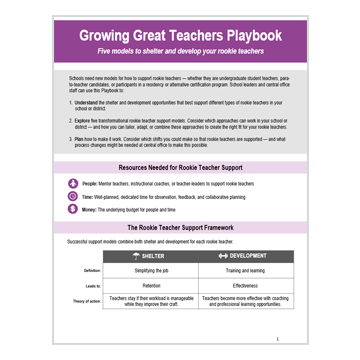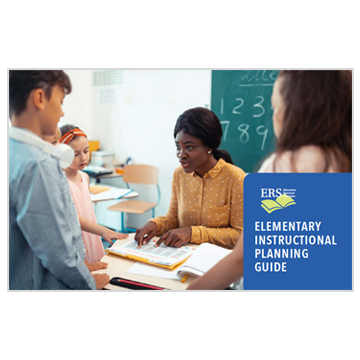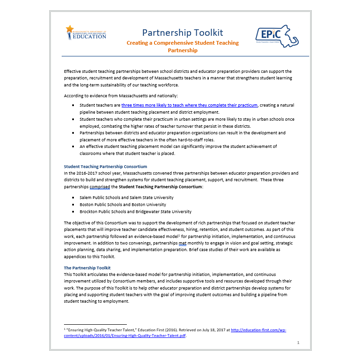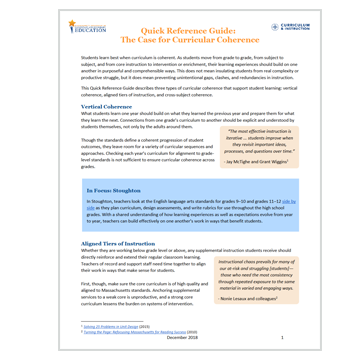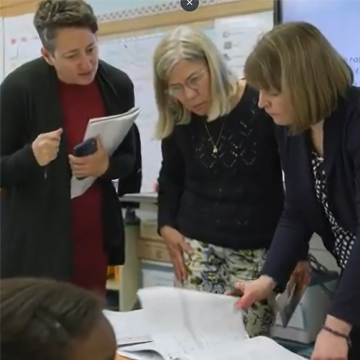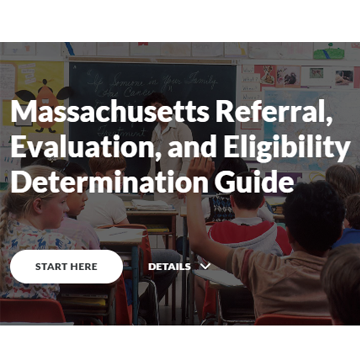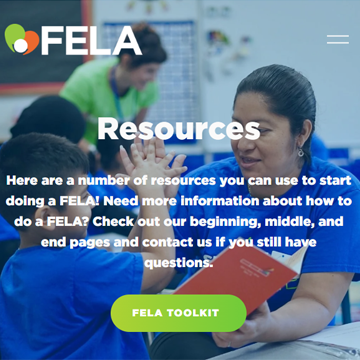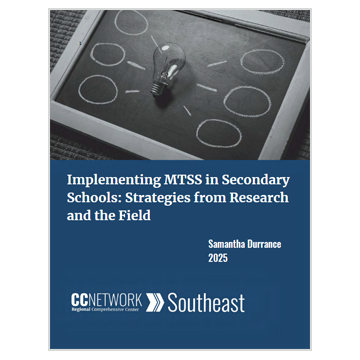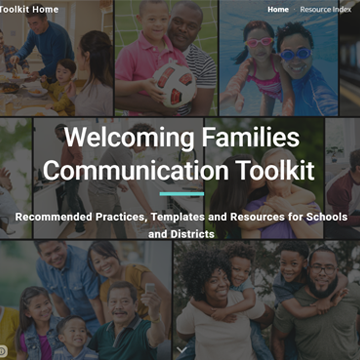Resource Profiles
New Resource Search
← Return to Find Resources | MTSS
Resource Results
Student-Selected Support
Learn how to implement a secondary support strategy where students reflect on their progress and select the 30-minute Student-Selected Support periods they need four days a week.
When Students Struggle: A Teacher’s Guide to Communicating with Families
This guide covers important guiding principles and overarching tips as well as specific conversation starters teachers can use.
The Ultimate Guide to UDL
This great round up of resources compiled by Katie Novak, a UDL leader in Massachusetts and beyond, covers a huge amount of territory: UDL basics and video explainers, common misconceptions, a UDL implementation rubric, a UDL assessment flowchart, what to look for to evaluate UDL implementation in classrooms, recommended books and much more.
Multi-Tiered Supports through Early Warning Systems (High School)
This resource focuses on implementing early warning systems, with a focus on the “ABCs” (absenteeism, behavior referrals, and course failure) which are highly predictive indicators for dropping out. Includes staffing, scheduling, and other resource shift examples, and highlights “do now” and “build toward” practices.
Targeted Academic Supports for High School Students
This guide focuses on ways high schools can provide additional instructional time and targeted attention for students who need more intensive support. It focuses on two of four primary models — flex blocks and “double dose” courses — with concrete examples of scheduling, staffing, and resource allocation strategies for the two featured approaches. The guide also provides links to resources on two other promising practices — acceleration academies and high dosage tutoring.
New Teacher Toolkit: Support for New Teachers
This robust new teacher support resource collection includes a Growing Teachers Playbook with five models for sheltering and developing rookie teachers, a video featuring teachers talking about their first year as a teacher, a tool to assess if your school has established the conditions for growing great teachers, case studies, and much more.
Elementary Instructional Planning Guide
This guidebook helps elementary school leaders and teams create a schedule that supports the school’s values and priorities. It focuses on 4 key decision points and provides a variety of scheduling examples.
Sustaining High-Quality Instructional Coaching in a Challenging Budget Environment
This practical resource compares the costs of different coaching models and options for shifting and prioritizing coaching investments.
Transforming High School by Redesigning the Ninth Grade Experience
Read about schools and one district that rethought the Grade 9 experience in order to create the best possible foundation for high school success. Each case study identifies the “change package” that led to improved student outcomes, resource and scheduling shifts, and structures that supported educator collaboration.
Building & Sustaining a Comprehensive Student Teaching Partnership Toolkit
Tools to help educator preparation and district partnerships develop systems for placing and supporting student teachers with the goal of improving student outcomes and building a pipeline from student teaching to employment.
Quick Reference Guide: The Case for Curricular Coherence
A quick reference guide focused on ensuring instruction aligns across classrooms and tiers in ways that maximize student learning.
OpenSci Ed
OpenSciEd is a Next Generation Science standards-aligned curriculum for elementary, middle, and high school students and is designed for how students learn science best. From 2018 to 2025, Massachusetts contributed to the development of these open-source K–12 science instructional materials through collaboration on scope and sequence, design specifications, and the instructional model of the curricular materials. The curriculum is available to download for free from the OpenSciEd website.
Investigating History
Investigating History is a comprehensive, authentic, inquiry-based curriculum aligned to the 2018 History/Social Science Framework, developed by DESE in collaboration with teachers, history scholars, and organizations across Massachusetts. Units for Grades 5-7 are available now. Pilot materials for Grades 3 and 4 are available to preview, with revised units available in summer 2026. The curriculum is available at no-cost to districts.
Curriculum Matters: IMplement MA Professional Learning Practices Video Series
Use this video collection to learn about ways educators in schools across Massachusetts are transforming professional learning using a variety of collaborative and lesson internalization methods.
Supporting Every Student: Academic Conferencing in High School
This guide helps educators put high school students at the center of conferencing. Tools include a student engagement matrix and strategies for engaging students who are in different places, conference planning and student preparation steps, a conference meeting protocol, coaching tips, and examples.
Massachusetts Special Education Referral, Evaluation, and Eligibility Determination Guide Training Module
This online training module for special educators and IEP teams provides an overview of the IEP process and related requirements including timelines, family communication, and key questions for determining eligibility.
Family-Educator Learning Accelerator Toolkit
Learn how to use 5-10 week cycles and a family workshop model to engage family members more deeply in literacy development. The FELA toolkit includes a introductory video, step by step guide; planner for teachers; family, student, and educator commitment sheets, phone scripts, and other resources. Reading tips are available in English and Spanish.
Implementing MTSS in Secondary Schools
Practical strategies to address logistical and instructional challenges secondary schools often encounter implementing MTSS including intervention blocks, scheduling, teaming, and other practices. The 2022 report focused on early implementation. The 2025 report updates and extends the toolkit of strategies and includes additional resources and examples. It also expands the focus of MTSS to include student well-being.
Edwin Analytics Getting Started Guide and Videos
Edwin Analytics is a powerful reporting and data analysis tool that gives authorized districts and state level users access to new information, reports, and perspectives on education and programs that specifically support improvements in teaching and learning.
Welcoming Families Communication Toolkit - MASSFEC
Use this online toolkit to reflect on and refine family communication practices that support the full range of families you serve.
← Return to Find Resources | MTSS
